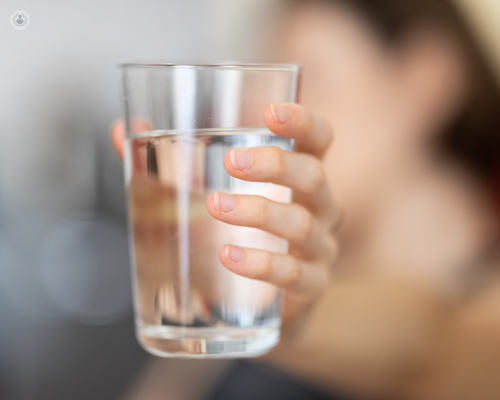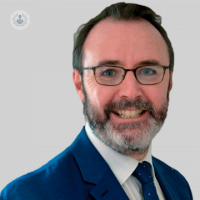Preparing for a colonoscopy
Written by:A colonoscopy is a diagnostic procedure that looks for changes inside your bowels and discovers what’s causing symptoms in the area. However, there’s a certain amount of preparation required from patients. So, what’s involved?
Here to provide a detailed insight is Mr David McArthur, a leading general and colorectal surgeon in Birmingham.

What's the best way to prepare for a colonoscopy?
We advise our patients that there are a number of things they need to do prior to having a colonoscopy. That includes:
- Dietary measures, which they do for a few days leading up to the procedure;
- Taking special bowel preparation medicine, which is a strong laxative drink that's taken prior to the procedure.
Usually, we say three days leading up to the colonoscopy, we advise patients to have what's called a low residue or low fibre diet. The things they should focus on eating are things like:
- White meat - skinless chicken;
- Grilled or poached fish;
- White bread;
- Pasta;
- Rice;
- Boiled or mashed potato;
- Cheese;
Ironically, we advise them to avoid things that doctors usually tell patients to eat. That's high fibre foods, so that includes any fruit or salad, potato skins, nuts, pulses, seeds and wholemeal bread.
The timing of the bowel preparation depends on the time of day the patients are having their colonoscopy. In essence, if for example they're having a colonoscopy in the morning, we ask to take all of them all of the bowel preparation the evening before. There are different types of bowel preparation that's used. They involve usually mixing up a powder with some water, into quite a large volume and drinking that relatively rapidly the evening before. That acts as strong laxative to flush the bowel out fully. We advise patients to also drink a lot of water in addition to the preparation if they can, just to aid with the process. If I'm being honest, that's the bit that most patients when they have a colonoscopy, say they struggle with the most, as opposed to the procedure itself. In essence, that's the preparation we advise.
Will I need to stay up all night the night before the colonoscopy?
That's a really good question, and it varies from person to person. So, if you take bowel prep in the evening, sort of late afternoon, evening, it's clearly going to have an effect on your bowels. It will make you go to the toilet numerous times, passing watery, loose motion, until the stuff that's coming out - often patients describe as brown water, as the end of what they pass.
It really does vary from person to person as to whether that occurs quite quickly or lasts for a longer period of time. Some people say the first lot of the bowel prep is usually divided into two lots and has an immediate effect. Other people say that it isn't until they take the second lot that it has an effect on their bowels. It's very, very different from patient to patient. Sometimes yes, they will be disturbed during the night having to go to the toilet, and other people less so.
How many days before the colonoscopy do I need to begin preparation?
As mentioned previously, we advise a low residue, low fibre diet for three days prior to the procedure.
When do I begin to fast or do I need to fast before a colonoscopy?
The advice really, is that if they're having a procedure in the morning, that we advise patients not to eat anything the day before, or after 3pm. So, a light lunch and then nothing else to eat.
They can have:
- Clear soup;
- Fruit juice without pulp or diluted cordials;
- Soft drinks;
- Herbal tea, black tea or coffee without milk.
That's generally the advice for a morning procedure.
Am I allowed to drink tea or coffee?
Yes, you can drink tea or coffee, up to about two hours before the procedure is when we advise patients not to drink anything further.
If you are drinking tea or coffee then having it black, without milk, is important.
How soon after the colonoscopy can I start eating normally again?
Most patients can start eating immediately afterwards. Most patients who come for a colonoscopy with us will be taken into the recovery unit of the endoscopy department, and they will be offered something light to eat; a sandwich, or an omelette or something like that. If they've had some sedation; as soon as that's worn off, something to eat and drink.
If you have colorectal concerns and would like to arrange an appointment with Mr McArthur, you can do so via his Top Doctors profile.


